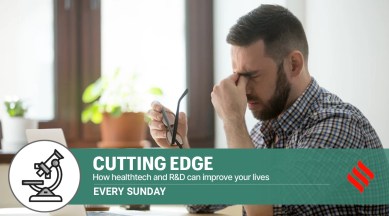Anonna Dutt is a Principal Correspondent who writes primarily on health at the Indian Express. She reports on myriad topics ranging from the growing burden of non-communicable diseases such as diabetes and hypertension to the problems with pervasive infectious conditions. She reported on the government’s management of the Covid-19 pandemic and closely followed the vaccination programme. Her stories have resulted in the city government investing in high-end tests for the poor and acknowledging errors in their official reports. Dutt also takes a keen interest in the country’s space programme and has written on key missions like Chandrayaan 2 and 3, Aditya L1, and Gaganyaan. She was among the first batch of eleven media fellows with RBM Partnership to End Malaria. She was also selected to participate in the short-term programme on early childhood reporting at Columbia University’s Dart Centre. Dutt has a Bachelor’s Degree from the Symbiosis Institute of Media and Communication, Pune and a PG Diploma from the Asian College of Journalism, Chennai. She started her reporting career with the Hindustan Times. When not at work, she tries to appease the Duolingo owl with her French skills and sometimes takes to the dance floor. ... Read More
NIMHANS develops workplace stress test: Why you need to take it for your heart health
NIMHANS researchers develop a tool to map the mental health of employees and help companies ease the work environment. 'Measuring stress is important because long-term stress has been linked to an increased risk of heart diseases and other non-communicable diseases,' says Dr Gautham M S, additional professor in the department of epidemiology.

Has your work been stressing you out? Is it leading to symptoms like irritability and disturbed sleep? Will it impact your health in the long run? You will find your answers in a colour-coded, 16-question tool that has been developed by researchers from the National Institute of Mental Health and Neurological Sciences (NIMHANS). It measures work stress and helps employers build a conducive work environment.
Not only that, the questionnaire –to be anonymously filled by employees – can inform employers which departments are the most stressed out and why.
monthly limit of free stories.
with an Express account.
“The employees will get a score after assessment depending on the demands made by the organisation, their ability to cope with it, and physical manifestation, if any, of this stress. This score will be colour-coded green, yellow, and red. People in the green category are those who report little or no stress and have no symptoms – for them, only follow-ups are suggested. Those in the yellow category need repeated counselling. And, those in the red category should immediately be screened for non-communicable diseases in addition,” says Dr Gautham M S, the corresponding author of the validation study for the tool, which was recently published in the PLOS One journal, and additional professor in the department of epidemiology at NIMHANS.
In addition, he says, employers will know where to make investments to get the best returns because the employees have already stated the reasons for their stress like excessive workload, less pay and lack of job security. And, if the assessment is made a part of annual health check-ups of employees, companies can measure how much their interventions have made a difference.
Called TAWS-16, the tool combines employees’ exposure to work-related stressors, their coping abilities to these stressors and their experience of psychosomatic symptoms. The three attributes are judged by questions on whether employees face a heavy workload constantly, are they required to multitask, whether they find the working conditions comfortable, whether they feel supported by seniors, and whether they experience symptoms like excessive tiredness, lack of energy, lack of motivation, frequent fights with colleagues, and disturbed sleep among others.
Dr Gautham says that this is the first tool designed to assess work stress that can be directly attributable to the employers. “Stress can be due to several reasons such as domestic situations. Existing tools cannot delineate between work stress and stress caused by other reasons. This tool, we have shown, can accurately measure work-related stress,” he explains. He also believes that while some stress is important in a competitive job scenario, trouble erupts if it lasts over a long period and the employee does not have a coping mechanism. This is the reason TAWS-16 looks at whether these complaints and symptoms have persisted over a period of six months.
The 16 questions take about 10 minutes to answer and a web application for the same has also been developed by the institute. The tool is available in six to seven languages and NIMHANS is in the process of using it to test professionals in different fields like IT, public health, textile and other sectors and re-assess its reliability.
Why should companies be worried about stress? Dr Gautham says that excessive work stress can increase burnout, absenteeism and presenteeism (being present at work but not performing the job role) leading to a loss of productivity for companies. As for workers, measuring stress is important because long-term stress has been linked to an increased risk of heart diseases and other non-communicable diseases.
The tool was developed by the researchers from NIMHANS keeping in mind the changing disease profile of India. “Exposure-related diseases like silicosis and asbestosis have reduced over the years among employees with government laws and regulations. However, there is an increase in non-communicable disease in the general population and consequently the workforce. So, we need more regulations to ensure protection against stress that is a public health risk factor,” he adds.